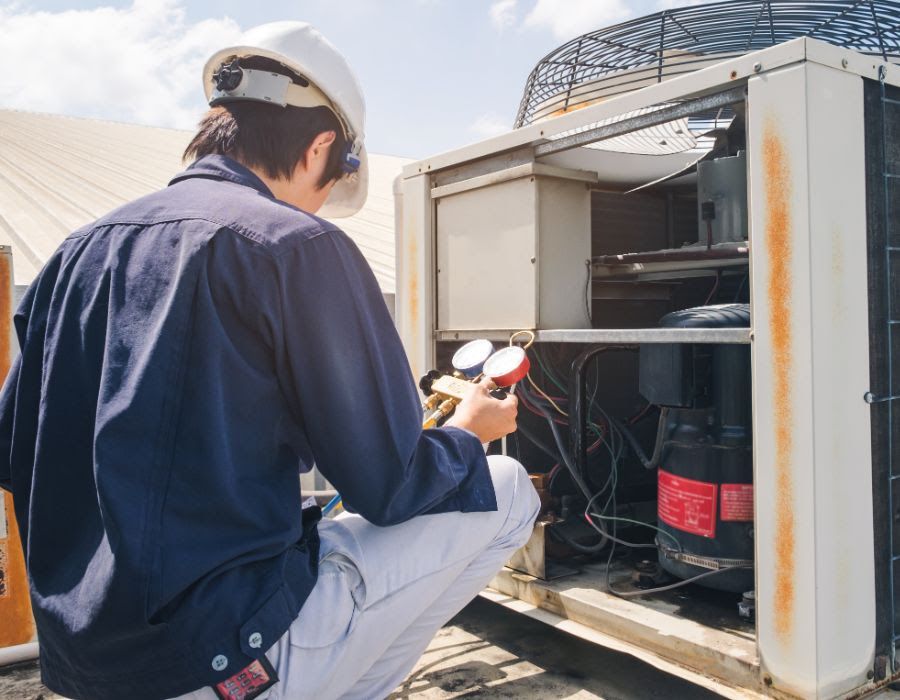AC Unit | Troubleshooting Common AC Problems in Stuart, FL


Living in Stuart, FL, we all know how important it is to have a well-functioning AC unit. It makes living in the hot and humid weather bearable. However, with constant use, your AC may face some common problems that can cause discomfort and even lead to costly repairs if not addressed on time. In this blog post, we will walk you through the most common AC problems that homeowners face and provide troubleshooting tips to help you fix them on your own. We will also discuss when it’s best to call in a professional HVAC contractor for repairs or maintenance. By the end of this post, you’ll have a good understanding of how to keep your AC running smoothly all year round while saving money on energy bills.
Recognizing Common AC Problems
Is your AC unit making unusual noises? Do you notice uneven cooling in different areas of your home? Perhaps your AC unit is constantly running without reaching the desired temperature. Another common problem is foul odors emanating from the vents or poor airflow. These issues can indicate underlying AC problems that need attention. By recognizing these common AC problems, you can take the necessary steps to address them and ensure your cooling system operates at peak performance throughout the year.
Symptoms of Failing AC Units
Is your AC unit not turning on at all? Are you experiencing frequent and sudden breakdowns? Do you notice inconsistent temperature control in your home? Have you observed rising energy bills without increased usage? Are there excessive moisture or leaks around your AC unit? These are common symptoms of failing AC units. If you encounter any of these issues, it’s important to address them promptly to ensure your cooling system in Stuart, FL is running at peak performance. Remember, regular maintenance and professional air conditioning services can help prevent these problems and keep your home cool and comfortable.
AC Not Cooling? Here’s What You Can Do
If your AC is not cooling, there are a few things you can do before calling a professional. Check the thermostat settings, clean or replace the air filter, clear any debris around the outdoor unit, inspect the ductwork for leaks, and consider scheduling a professional HVAC inspection.
Top Reasons for AC Breakdown
Regular maintenance and cleaning are crucial to prevent AC breakdown. Refrigerant leaks or low levels can cause cooling problems. Electrical issues, such as faulty wiring or capacitor problems, can lead to AC malfunctions. Frozen evaporator coils due to restricted airflow affect the cooling system. Aging or worn-out components like compressors or fans can also contribute to AC breakdown. By addressing these issues promptly, homeowners in Stuart, FL can ensure their AC units operate at peak performance throughout the year.

The Role of Regular Maintenance in Preventing AC Problems
Regular maintenance plays a crucial role in preventing AC problems. It extends the lifespan of your air conditioning unit, improves energy efficiency, and reduces operating costs. By identifying and addressing potential issues before they become major problems, regular maintenance ensures optimal performance and prevents unexpected breakdowns. Additionally, it enhances indoor air quality by cleaning or replacing filters. With regular maintenance, you can enjoy the benefits of a well-functioning cooling system year-round in Stuart, FL.
Why is My AC Blowing Warm Air?
Possible output: Experiencing warm air from your AC? It could be due to low refrigerant levels, dirty air filters, compressor or condenser issues, wrong thermostat settings, or faulty components. Addressing these issues can help restore cool air flow in your home.
DIY Troubleshooting Tips for AC Problems
If you’re experiencing AC problems, here are some DIY troubleshooting tips to try before calling a professional. Check the circuit breaker and reset it if necessary. Clean the air vents to ensure they’re not blocked and obstructing airflow. Inspect and clean the outdoor condenser unit to remove any debris or dirt. Monitor and adjust thermostat settings as needed for optimal cooling. Lastly, remember to replace or clean the air filter regularly to maintain proper airflow and peak performance of your AC system.
Steps to Take When Your AC is Not Cooling
If your AC is not cooling, there are several steps you can take to troubleshoot the issue. First, check the thermostat settings and adjust them if needed. Next, inspect the air filter and replace it if it’s dirty or clogged. Make sure to clean the outdoor condenser unit of any debris or obstructions that may be affecting its performance. Additionally, verify that all supply vents are open and unobstructed to ensure proper airflow. If the problem persists, consider scheduling a professional HVAC service for a more thorough diagnosis.

How to Handle an AC Leaking Water
If you notice your air conditioning unit leaking water, it’s crucial to take immediate action to prevent further damage. Turn off the AC unit right away to avoid any potential harm. Check the condensate drain line for any blockages or leaks that could be causing the issue. Additionally, cleaning or replacing the air filter can help improve airflow and prevent ice buildup, which can contribute to water leakage. For a thorough diagnosis and repair, schedule a professional HVAC inspection. Installing a condensate pump or drain pan is also a good preventive measure against future leaks.When to Call a Professional HVAC Contractor
If your AC unit is not functioning at all or experiencing frequent breakdowns, it’s time to call a professional HVAC contractor. Unusual smells, noises, or vibrations coming from the unit are also an indication that you need professional help. Inconsistent temperatures and poor airflow throughout your home can be resolved by a skilled technician. Additionally, if you notice excessive moisture, leaks, or water damage around the AC unit, it’s best to seek professional assistance. Even after trying DIY troubleshooting efforts, if you still lack cooling, it’s crucial to contact a professional for a thorough assessment and repair.Choosing the Right HVAC Contractor in Stuart, FL
When selecting an HVAC contractor in Stuart, FL for your air conditioning needs, it’s essential to consider a few key factors. Look for certified HVAC contractors who can provide quality service and have the necessary expertise in handling AC systems. Customer reviews and ratings can offer valuable insights into the contractor’s reputation. It’s also advisable to get multiple quotes from different contractors to compare prices. Additionally, ensure that the contractor is licensed and insured for your protection. By choosing the right HVAC contractor, you can ensure that your cooling system operates at peak performance throughout the year.Understanding HVAC Repair Costs in Stuart, FL
Understanding the cost of HVAC repairs in Stuart, FL is crucial for homeowners. These costs can vary depending on the extent of the problem, making it essential to have a clear understanding of what you’re paying for. Regular maintenance plays a significant role in preventing costly repairs in the long run. Before proceeding with any repairs, it’s important to get a detailed breakdown of the costs involved. If the repair costs seem too high, considering getting second opinions can help. It’s also worth comparing the repair costs with the cost of a new AC unit to make an informed decision.Saving Energy with Efficient AC Usage
To save energy and optimize your AC usage, there are a few simple steps you can take. First, set your thermostat to a comfortable temperature to avoid overworking your air conditioning system. Additionally, utilizing ceiling fans can help circulate cool air and reduce reliance on the AC. Remember to keep windows and doors closed to prevent cool air from escaping. Regular maintenance is also essential for peak performance, so be sure to schedule regular maintenance for your cooling system. Consider upgrading to a programmable thermostat for better energy management.Maintaining Your AC for a Comfortable Home
To ensure a comfortable home, it is essential to regularly maintain your air conditioning system. Start by changing the air filter, which promotes good airflow and improves indoor air quality. Additionally, keep the outdoor unit free from debris and vegetation for optimal performance. Another important step is to clean the evaporator and condenser coils to enhance cooling efficiency. It’s also crucial to monitor refrigerant levels to prevent system malfunctions. Lastly, schedule annual professional maintenance to keep your AC in peak condition for the hot days of Stuart, FL.
